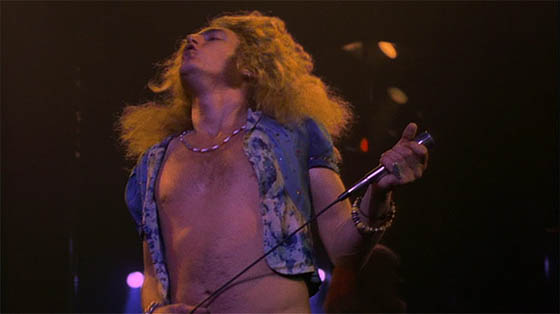 By the time Led Zeppelin’s The Song Remains the Same was finally released, the band hardly cared anymore. They needed to put something out; the car accident which had left Robert Plant and his family with severe injuries had placed the band on hiatus for too long, and their latest album, Presence, was perceived as a mild disappointment. The idea of a Led Zeppelin movie had been struck many years before, and shooting was initiated, to great expense, and then scrapped with a defeated shrug. Joe Massot, who directed the psychedelic, George Harrison-scored Wonderwall (1968), had been hired to gather footage of the band members. He filmed the four men – as well as Zeppelin manager Peter Grant and tour manager Richard Cole – as they saw themselves, often in elaborate fantasy sequences. Later, Massot was permitted to film their last performances in New York City’s Madison Square Garden, the tail-end of their 1973 American tour. The band was physically exhausted. Guitarist Jimmy Page was recovering from an injured hand, and was forcing his way through each three-hour performance as a sheer force of will. Morale was low, and midway through one of their concerts, the news reached them that someone had stolen $200,000 from their hotel room safe. They played on anyhow. Watching the footage afterward, the band thought the performance was not up to their standards. Three years later, urgently wishing to keep Led Zeppelin high in the pop culture consciousness, they hired a veteran concert film director, Peter Clifton, to piece it all together, and then decided that what they had was good enough. (The critics largely disagreed.)
By the time Led Zeppelin’s The Song Remains the Same was finally released, the band hardly cared anymore. They needed to put something out; the car accident which had left Robert Plant and his family with severe injuries had placed the band on hiatus for too long, and their latest album, Presence, was perceived as a mild disappointment. The idea of a Led Zeppelin movie had been struck many years before, and shooting was initiated, to great expense, and then scrapped with a defeated shrug. Joe Massot, who directed the psychedelic, George Harrison-scored Wonderwall (1968), had been hired to gather footage of the band members. He filmed the four men – as well as Zeppelin manager Peter Grant and tour manager Richard Cole – as they saw themselves, often in elaborate fantasy sequences. Later, Massot was permitted to film their last performances in New York City’s Madison Square Garden, the tail-end of their 1973 American tour. The band was physically exhausted. Guitarist Jimmy Page was recovering from an injured hand, and was forcing his way through each three-hour performance as a sheer force of will. Morale was low, and midway through one of their concerts, the news reached them that someone had stolen $200,000 from their hotel room safe. They played on anyhow. Watching the footage afterward, the band thought the performance was not up to their standards. Three years later, urgently wishing to keep Led Zeppelin high in the pop culture consciousness, they hired a veteran concert film director, Peter Clifton, to piece it all together, and then decided that what they had was good enough. (The critics largely disagreed.)
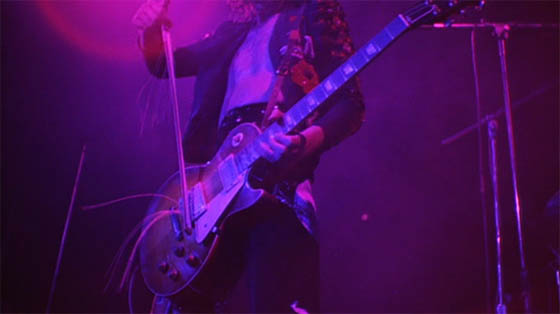 Still, the film has endured as a part of Led Zeppelin’s legacy, and even a “mediocre” Led Zeppelin performance is quite an experience. The central image of the film is Robert Plant’s chest and torso, exposed, slick with sweat, stretching or spasming as he moves and gestures, above it all a mop of blond curls that occasionally reveal his typically wry grin. When the camera backs up a bit, we’re left to contemplate that those tight, tight pants leave nothing to the imagination (as a Rutles mum might say). He once called himself the “golden god,” but he’s more like a living fertility idol. Beside him, Jimmy Page bows his guitar until the strings of the bow are splitting, and it resembles a tangle of wires; but he’s still pulling the most unearthly noises from it, ever the group’s mystic. John Paul Jones solemnly plays the keys or bass, seldom given a spotlight. John Bonham beats the drums…forever. He never stops. He plays his long “Moby Dick” solo so the rest of the band can leave the stage and have a respite, but he keeps at it for the whole concert. He’s like some brutal machine.
Still, the film has endured as a part of Led Zeppelin’s legacy, and even a “mediocre” Led Zeppelin performance is quite an experience. The central image of the film is Robert Plant’s chest and torso, exposed, slick with sweat, stretching or spasming as he moves and gestures, above it all a mop of blond curls that occasionally reveal his typically wry grin. When the camera backs up a bit, we’re left to contemplate that those tight, tight pants leave nothing to the imagination (as a Rutles mum might say). He once called himself the “golden god,” but he’s more like a living fertility idol. Beside him, Jimmy Page bows his guitar until the strings of the bow are splitting, and it resembles a tangle of wires; but he’s still pulling the most unearthly noises from it, ever the group’s mystic. John Paul Jones solemnly plays the keys or bass, seldom given a spotlight. John Bonham beats the drums…forever. He never stops. He plays his long “Moby Dick” solo so the rest of the band can leave the stage and have a respite, but he keeps at it for the whole concert. He’s like some brutal machine.
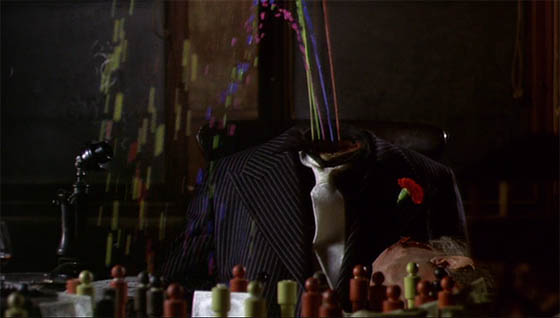
I’ll admit something here: I have a weakness for self-indulgent surrealistic nonsense of the late 60’s and early 70’s. The more self-indulgent the better. The film’s most astoundingly naked flaw is Massot’s prolonged fantasy sequences, filming whatever the band thought might be kind of cool. This is what led to Magical Mystery Tour (1967), folks. Richard Lester knew what would make a good film; the Beatles, free of his guiding hand, did not. And Led Zeppelin was clearly spitballing; Massot just went with it. What you get is some pretty weird, goofy material, much of it attractively filmed. The film opens with its most bizarre sequence, because…where else are you going to put it? I mean, really? Peter Grant and Richard Cole are dressed as 1930’s gangsters, with the requisite tommy guns. They exit a country estate and board a 30’s car with grim faces – that’s right, something real is going down, and I doubt it has anything to do with Led Zeppelin. Elsewhere, some gangsters are playing a strange board game (it looks like it’s based on The Great Escape) for cash. One of the players has no face. Another is a werewolf. Grant and Cole and their lackeys burst into the room and exchange gunfire. The werewolf goes down in slow motion, screaming; it’s spectacular. An old gangster fires dispassionately with his revolver. His head is shot off; it goes tumbling to the table, and out of his neck spew multi-colored streams of ink. Take notes, there will be a test later.
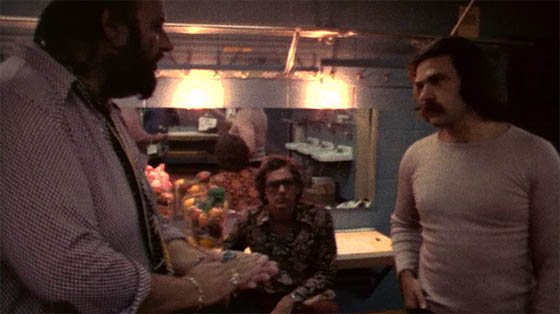 It’s telling that Grant and Cole saw themselves as glorious mobsters. It also reflects their reputation. Grant set a precedent when he demanded that 90% of the profits from each concert go directly to the band. Led Zeppelin entered each city like a pirate raid, and Grant and Cole were the captain and his first mate. The film occasionally cuts to backstage footage, and we see how Grant holds his ground and firmly confronts the theater management about the sale of bootlegged Zeppelin posters. He points aggressively with a hand heavily outfitted with oversized rings: pure intimidation. It’s easy to see how Tony Hendra could borrow liberally from this scene for his performance as the volatile, fiercely protective manager Ian in This is Spinal Tap (1984).
It’s telling that Grant and Cole saw themselves as glorious mobsters. It also reflects their reputation. Grant set a precedent when he demanded that 90% of the profits from each concert go directly to the band. Led Zeppelin entered each city like a pirate raid, and Grant and Cole were the captain and his first mate. The film occasionally cuts to backstage footage, and we see how Grant holds his ground and firmly confronts the theater management about the sale of bootlegged Zeppelin posters. He points aggressively with a hand heavily outfitted with oversized rings: pure intimidation. It’s easy to see how Tony Hendra could borrow liberally from this scene for his performance as the volatile, fiercely protective manager Ian in This is Spinal Tap (1984).
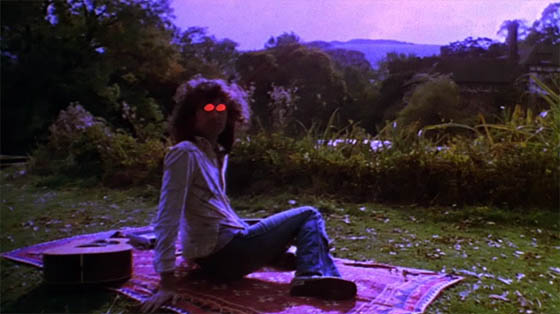 The music-free, excessively curious opening scenes also portray Robert Plant and family in a country idyll (his nude children frolic in a creek); classic-car collector John Bonham working on his Model T; John Paul Jones, in Prince Valiant hair, reading “Jack and the Beanstalk” to his children at bedtime; and Jimmy Page, sitting on an Oriental rug beside his guitar, sunglasses glowing bright orange as though he’s been possessed by some pagan god of rock and roll. Like superheroes being summoned back to the Justice League headquarters, each of the men is delivered a list of tour dates – and so they’re off to New York in their private jet (with the words “Led Zeppelin” painted on the side; they called it the Starship). During the performance, hallucinatory interludes take us away from Madison Square Garden and to: Robert Plant receiving a sword and embarking upon an epic quest, battling knights in a castle; a horse-mounted John Paul Jones wearing a fright mask and stalking a young woman; John Bonham drag racing (appropriately set during his propulsive drum solo); and Jimmy Page climbing a mountain to confront the old hermit of the Tarot, who swings a psychedelic sword, de-ages into Page himself, and then further, into a Star Child-like fetus – and back to an old man again. Heavy stuff.
The music-free, excessively curious opening scenes also portray Robert Plant and family in a country idyll (his nude children frolic in a creek); classic-car collector John Bonham working on his Model T; John Paul Jones, in Prince Valiant hair, reading “Jack and the Beanstalk” to his children at bedtime; and Jimmy Page, sitting on an Oriental rug beside his guitar, sunglasses glowing bright orange as though he’s been possessed by some pagan god of rock and roll. Like superheroes being summoned back to the Justice League headquarters, each of the men is delivered a list of tour dates – and so they’re off to New York in their private jet (with the words “Led Zeppelin” painted on the side; they called it the Starship). During the performance, hallucinatory interludes take us away from Madison Square Garden and to: Robert Plant receiving a sword and embarking upon an epic quest, battling knights in a castle; a horse-mounted John Paul Jones wearing a fright mask and stalking a young woman; John Bonham drag racing (appropriately set during his propulsive drum solo); and Jimmy Page climbing a mountain to confront the old hermit of the Tarot, who swings a psychedelic sword, de-ages into Page himself, and then further, into a Star Child-like fetus – and back to an old man again. Heavy stuff.
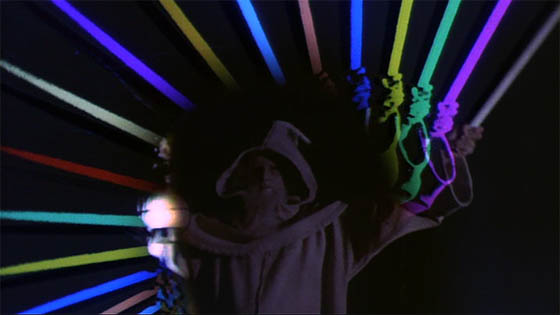 There’s plenty of time for all this, because Led Zeppelin, live, stretched their songs to the absolute limit, improvising, keeping themselves amused. “Stairway to Heaven,” so rigorously structured, is kept intact, but the film’s centerpiece is a performance of “Dazed and Confused” which drifts happily off course for half an hour, with Plant at one point even singing a bit of Scott McKenzie’s “San Francisco (Be Sure to Wear Flowers in Your Hair).” Eventually, after guitar solo after guitar solo, the trademark monster riff of “Dazed and Confused” is flown back in, and they close where they began. They saw their music as a Tolkienesque journey, and the vast mobs that gathered before their stage were eager to go with them, wherever it led (thus all the lyrics about Viking raids and Mordor). So it’s appropriate that Peter Clifton uses all of Joe Massot’s non-concert footage as “head trip” moments to goose the concert material; we’re on a long trip, after all – might as well give the audience something fresh to look at while the music plays.
There’s plenty of time for all this, because Led Zeppelin, live, stretched their songs to the absolute limit, improvising, keeping themselves amused. “Stairway to Heaven,” so rigorously structured, is kept intact, but the film’s centerpiece is a performance of “Dazed and Confused” which drifts happily off course for half an hour, with Plant at one point even singing a bit of Scott McKenzie’s “San Francisco (Be Sure to Wear Flowers in Your Hair).” Eventually, after guitar solo after guitar solo, the trademark monster riff of “Dazed and Confused” is flown back in, and they close where they began. They saw their music as a Tolkienesque journey, and the vast mobs that gathered before their stage were eager to go with them, wherever it led (thus all the lyrics about Viking raids and Mordor). So it’s appropriate that Peter Clifton uses all of Joe Massot’s non-concert footage as “head trip” moments to goose the concert material; we’re on a long trip, after all – might as well give the audience something fresh to look at while the music plays.
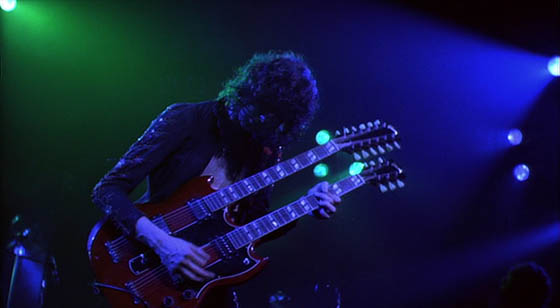 Naturally, the straightforward concert footage has aged much better. Even if it doesn’t capture the band at its best, it does grab them at their height, with all their innovations on display. Plant, for example, playfully imitating Page’s hammer-struck chords with some borderline scatting. The intuitive way all four members of the band can improvise together, exploring without ever losing sight of the path. The bowing, the double-neck guitar, the on-stage explosions and light shows that would later become the standard for big heavy metal shows. For the finale of their finale, “Whole Lotta Love,” the gong behind John Bonham bursts into flames, and he pounds it with a flaming drumstick. Massot’s crew captures Plant posing before the flaming gong, bathed in the murky glow of a green spotlight. After that, there’s nowhere left to go. They bid the sweating masses farewell, and we follow the pirate-ship Led Zeppelin backstage, marching at a swift pace. Page wears a particularly ecstatic smile: another village sacked and burned to the ground.
Naturally, the straightforward concert footage has aged much better. Even if it doesn’t capture the band at its best, it does grab them at their height, with all their innovations on display. Plant, for example, playfully imitating Page’s hammer-struck chords with some borderline scatting. The intuitive way all four members of the band can improvise together, exploring without ever losing sight of the path. The bowing, the double-neck guitar, the on-stage explosions and light shows that would later become the standard for big heavy metal shows. For the finale of their finale, “Whole Lotta Love,” the gong behind John Bonham bursts into flames, and he pounds it with a flaming drumstick. Massot’s crew captures Plant posing before the flaming gong, bathed in the murky glow of a green spotlight. After that, there’s nowhere left to go. They bid the sweating masses farewell, and we follow the pirate-ship Led Zeppelin backstage, marching at a swift pace. Page wears a particularly ecstatic smile: another village sacked and burned to the ground.









